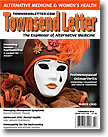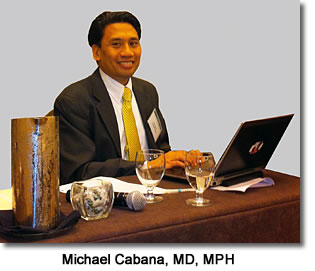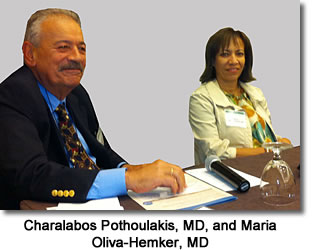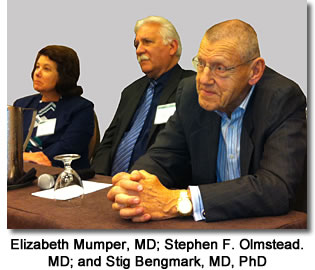|
![]()
From the Townsend Letter |
||||
7th Annual Probiotic Symposium Highlights Probiotics:
Current Perspectives and Controversies |
||||
Dr. Russell Jaffe, internist, molecular biochemist, clinical pathologist, diagnostician, and lab director of ELISA/ACT Biotechnologies LLC and Perque LLC, opened the CME symposium by providing an insightful overview of food intolerances, a problem affecting nearly everyone at some point. He began by reviewing normal and disordered immune responses. Jaffe was tasked with reviewing the current understanding and research on the human microbiome, the totality of microorganisms residing on and in the human body, their genetic elements (genomes), and their interactions with their host. He discussed a variety of specific biomarkers that may be used to evaluate human health. Stig Bengmark, MD, PhD, chief of surgery for over 20 years at Lund University Hospital in Sweden and now Visiting Professor at University College London, presented a lecture intriguingly titled "Dirty Cells & Leaking Membranes – a Mother of Disease." Bengmark asserted that dysbiosis, which he characterized as a malfunctioning microbiota, underlies most chronic disease by causing systemic inflammation. He emphasized that a healthy, balanced microbiota begins with a healthful diet and argued that pharmacologic agents and a healthy microbiota are incompatible. Bengmark highlighted the link between processed foods, dysbiosis, and the global epidemic of obesity. He reviewed the link between endotoxin association and an array of disorders ranging from Alzheimer's disease to cancer and pointed out that increased intestinal permeability due to dysbiosis is a major risk factor for endotoxin exposure. Bengmark suggested that a healthful diet includes raw greens and small amounts of vegetable fats and proteins, and eliminates dairy and gluten. He concluded by urging attendees to make peace with their microbiotas. Charalabos Pothoulakis, MD, is the world's authority on the use of Saccharomyces boulardii for Clostridium difficile-associated disease. Pothoulakis focused on probiotic mechanisms of action, reviewing research performed in his laboratory showing that S. boulardii's beneficial effect in C. difficile-associated disease is due in part to prevention of inhibitory kBa degradation. This effect prevents C. difficile's toxin A from activating nuclear factor-kB (NF-kB), which is how toxin A causes colonocyte death. Pothoulakis also reported that supernatant from S. boulardii culture inhibits inflammatory interleukin-8 production and blocks NF-kB-mediated gene transcription. He reviewed evidence that supernatant from a multispecies probiotic formulation inhibits tumor necrosis factor (TNF) stimulation of NF-kB and presented evidence that Lactobacillus rhamnosus GG produces two proteins that rescue colonocytes from TNF-induced damage and apoptosis. Pothoulakis outlined ongoing research on the multiple beneficial effects of S. boulardii by reducing production of proinflammatory cytokines, restoring gut microbiota balance, exerting trophic effects on the intestinal mucosa, and increasing gut sIgA.
Gerard E. Mullin, MD, associate professor of medicine and director of Integrative Nutrition Services at Johns Hopkins School of Medicine and Hospital, opened the second day of the CME symposium with a masterful review of the contribution of the gut microbiota to the development of obesity and metabolic disease and explored the potential use of probiotics to maintain a normal weight and treat metabolic syndrome. Mullin reviewed the definition and prevalence of obesity as well as the epidemiology of this expanding epidemic and its adverse health consequences. He outlined animal data supporting a role for the gastrointestinal microbiota in obesity emphasizing an imbalance between the phyla Bacteroidetes and Firmicutes. Mullen noted this relationship is variable and that Lactobacillus acidophilus, a member of the Firmicutes phylum, has been used to promote weight loss following gastric bypass surgery. He noted that exposure to low levels of antibiotics in the diet, such as those used in agriculture, alter the gut microbiota and may be associated with obesity. Mullen summarized animal and human studies that have used probiotics to promote weight loss. He concluded by reviewing probable mechanisms whereby probiotics may exert antiobesity effects such as induction of satiety, decreased lipid absorption, increased conjugated linoleic acid production, and increased brown tissue thermogenesis.
Stephen F. Olmstead, MD, chief science officer at ProThera and Klaire Labs, reviewed the rediscovery of Helicobacter pylori by Warren and Marshall and its basic microbiology. Olmstead discussed a neglected aspect of the gastrointestinal microbiota, the enigmatic stomach community, and outlined research showing that Helicobacter pylori is part of a complex, yet-to-be-understood gastric microbiota. He presented studies showing that H. pylori has been associated with humans for as long as there have been humans and accompanied humankind out of Africa and into the world. He stated that while H. pylori can clearly cause disease such as gastritis, peptic ulcer disease, and gastric cancer, recent research suggests that colonization may have health benefits such as reducing the incidence of gastroesophageal reflux and esophageal cancer. Olmstead urged circumspection in treating H. pylori when there are no clinical symptoms or family history of gastric cancer and said that interventions such as probiotics, antibiofilm enzymes, antioxidants, lactoferrin, and N-acetylcysteine can be used synergistically to increase treatment success in patients requiring pharmaceutical therapy. The CME symposium was preceded by a non-CME workshop on the afternoon of October 24. This workshop provided a review of practical, clinically relevant aspects of probiotic use, laboratory evaluation of the gastrointestinal microbiota and pathogens, and treatment of pathogenic gastrointestinal and systemic biofilms. Dr. Olmstead outlined the classification and properties of probiotic microbes and presented his professional experience using probiotics and prebiotics for a variety of gastrointestinal and systemic indications. David Quig, PhD, vice president, scientific support for Doctor's Data Inc., reviewed the current state of evaluating gastrointestinal microbiology using culture-dependent and DNA sequencing technologies. He noted the limitations of clinically available DNA sequencing methodologies that have been found in one study to be plagued by significant inaccuracies. Quig highlighted new enhanced culture-dependent technology, called matrix assisted laser desorption ionization-time of flight mass spectrometry (MALDI-TOF/MS), which allows the use of species-specific peptidic spectra, primarily from ribosomal proteins, derived directly from intact colonies to facilitate rapid identification of gastrointestinal bacteria, mycobacteria, and fungi. Olmstead concluded the non-CME workshop by reviewing the role of microbial biofilms in health and disease and outlining approaches to disrupting pathogenic gastrointestinal biofilm to improve response rates in conditions such as systemic candidiasis sensitivity. An audio CD set with the accompanying CME symposium syllabus is available for purchase at www.ProbioticSymposium.com or by calling 888-488-2488. The eighth Annual Probiotic Symposium will focus on the role of the gut microbiota in health and disease and its manipulation with diet, prebiotics, and probiotics and is planned to take place in fall 2014.
|
||||
![]()
Consult your doctor before using any of the treatments found within this site.
![]()
Subscriptions
are available for
Townsend Letter, the Examiner of Alternative Medicine
magazine, which is
published 10 times each year. Search our pre-2001
archives for further information. Older issues of the printed magazine
are also indexed for your convenience.
1983-2001
indices ; recent indices. Once you find the magazines you'd like to order, please
use our
convenient form, e-mail subscriptions@townsendletter.com,
or call 360.385.6021.
360.385.6021
Fax: 360.385.0699
info@townsendletter.com
Who are
we? | New articles | Featured
topics | e-Edition |
Tables of contents | Subscriptions | Contact
us | Links | Classifieds | Advertise |
Alternative
Medicine Conference Calendar | Search site | Archives |
EDTA Chelation Therapy | Home
© 1983-2014 Townsend Letter
All rights reserved.
Website by Sandy
Hershelman Designs





 Michael Cabana, MD, MPH, professor of pediatrics, epidemiology, and biostatistics and chief of the Division of General Pediatrics at the University of California, San Francisco, provided a lucid overview of the hygiene hypothesis and the current epidemic of allergic diseases. Cabana outlined the epidemiologic relation between the reduced prevalence of infectious diseases in childhood, improved sanitation and housing, increased usage of antibiotics, and smaller family sizes and the burgeoning incidence of allergic diseases and asthma. He presented clinical research showing that probiotics administered to pregnant women for 1 month prenatally and then to infants for 6 months postpartum significantly reduced the development of atopic eczema, noting that this probiotic-mediated decrease in risk has persisted for 7 years. Cabana highlighted the difficulties encountered when reviewing clinical trials involving probiotics, emphasizing differences in probiotic microorganisms utilized, differing dosing regimens, and a variety of confounding factors such as whether a study is conducted in an urban or rural setting. Cabana proceeded to deliver a status report on his ongoing NIH-sponsored trial of probiotics to prevent the development of early markers of asthma in infants at high risk for developing asthma. To date 200 families have been recruited into this multicenter trial. He concluded by stating that probiotics are clearly effective for treating diarrhea and colic in infancy, are safe, and hold great promise for the prevention and treatment of allergic disorders and asthma. However, Cabana stated that the evidence was insufficient to recommend adding probiotics to infant formula to prevent allergic disease or food sensitivity.
Michael Cabana, MD, MPH, professor of pediatrics, epidemiology, and biostatistics and chief of the Division of General Pediatrics at the University of California, San Francisco, provided a lucid overview of the hygiene hypothesis and the current epidemic of allergic diseases. Cabana outlined the epidemiologic relation between the reduced prevalence of infectious diseases in childhood, improved sanitation and housing, increased usage of antibiotics, and smaller family sizes and the burgeoning incidence of allergic diseases and asthma. He presented clinical research showing that probiotics administered to pregnant women for 1 month prenatally and then to infants for 6 months postpartum significantly reduced the development of atopic eczema, noting that this probiotic-mediated decrease in risk has persisted for 7 years. Cabana highlighted the difficulties encountered when reviewing clinical trials involving probiotics, emphasizing differences in probiotic microorganisms utilized, differing dosing regimens, and a variety of confounding factors such as whether a study is conducted in an urban or rural setting. Cabana proceeded to deliver a status report on his ongoing NIH-sponsored trial of probiotics to prevent the development of early markers of asthma in infants at high risk for developing asthma. To date 200 families have been recruited into this multicenter trial. He concluded by stating that probiotics are clearly effective for treating diarrhea and colic in infancy, are safe, and hold great promise for the prevention and treatment of allergic disorders and asthma. However, Cabana stated that the evidence was insufficient to recommend adding probiotics to infant formula to prevent allergic disease or food sensitivity. Maria Oliva-Hemker, MD, chief of the Division of Pediatric Gastroenterology and Nutrition at Johns Hopkins University School of Medicine, presented a lecture titled "Probiotics and Necrotizing Enterocolitis: Ready for Prime Time." Oliva-Hemker discussed the normal neonatal acquisition of the gastrointestinal microbiota and outlined factors that may disrupt an infant's microbiota and the health consequences of such disruptions. She reviewed the clinical characteristics of necrotizing enterocolitis (NEC) and the associated high mortality. She discussed the roles of a disrupted epithelial barrier, elevated proinflammatory cytokines, intestinal mucosal inflammation, and gut dysbiosis in the pathophysiology of NEC. Oliva-Hemker emphasized that research supporting the use of probiotics has been conducted where the incidence of NEC was high, while research showing no benefit has been performed where the incidence is low. The preponderance of evidence has shown that certain probiotics consistently reduce the incidence of NEC and are safe, although the long-term effects on probiotic use in infancy remains unknown.
Maria Oliva-Hemker, MD, chief of the Division of Pediatric Gastroenterology and Nutrition at Johns Hopkins University School of Medicine, presented a lecture titled "Probiotics and Necrotizing Enterocolitis: Ready for Prime Time." Oliva-Hemker discussed the normal neonatal acquisition of the gastrointestinal microbiota and outlined factors that may disrupt an infant's microbiota and the health consequences of such disruptions. She reviewed the clinical characteristics of necrotizing enterocolitis (NEC) and the associated high mortality. She discussed the roles of a disrupted epithelial barrier, elevated proinflammatory cytokines, intestinal mucosal inflammation, and gut dysbiosis in the pathophysiology of NEC. Oliva-Hemker emphasized that research supporting the use of probiotics has been conducted where the incidence of NEC was high, while research showing no benefit has been performed where the incidence is low. The preponderance of evidence has shown that certain probiotics consistently reduce the incidence of NEC and are safe, although the long-term effects on probiotic use in infancy remains unknown. Dr. Elizabeth Mumper, president and CEO of the Rimland Center, which focuses on the biomedical treatment of children and young adults with autism spectrum disorders, and associate professor of medicine, pediatrics, at the Edward Via Virginia College of Osteopathic Medicine, spoke on the treatment of gastrointestinal disturbances in autism. She stated that autism spectrum disorders (ASD) are characterized by impaired communication; poor social interactions; and repetitive, restrictive, and/or stereotyped behaviors. She presented recent evidence showing that children with ASD and ileocolitis have a distinctive mucosal molecular profile that supports the presence of an ASD-associated inflammatory bowel disease variant. Mumper emphasized the high prevalence of gut disorders in autism and reviewed the evidence for complex lines of communication between the brain and the gut known as the brain–gut axis. She asserted that many behavioral problems in children with ASD may be manifestations of gastrointestinal pain in those who are nonverbal. She analogized ASD-associated gastrointestinal disease to celiac disease, in which central nervous system symptoms as a consequence of gut inflammation and immune reaction are well described. Mumper outlined the clinical approach to the biomedical treatment of children with autism. She stressed a healthful diet based on fresh, organic foods free of additives, preservatives, and dyes. She reviewed the adverse effects of fructose on health and the need to avoid foods and beverages containing high-fructose corn syrup. Mumper stated that many children will require gluten-free, casein-free diets. She highlighted the role of probiotics in eliminating gut pathogens and restoring a healthful, balanced intestinal microbiota. She accentuated the need to replenish nutritional deficiencies with supplements, maintain adequate vitamin D levels, and support methylation pathways that are often compromised in children with autism. Mumper finished her valuable presentation by emphasizing that each child is unique and therapy must be tailored to each individual. She urged attendees to look with new eyes and consider self-abusive behavior, difficulty toilet training, and insomnia as manifestations of gut pain, gastrointestinal disease, and gastrointestinal esophageal reflux.
Dr. Elizabeth Mumper, president and CEO of the Rimland Center, which focuses on the biomedical treatment of children and young adults with autism spectrum disorders, and associate professor of medicine, pediatrics, at the Edward Via Virginia College of Osteopathic Medicine, spoke on the treatment of gastrointestinal disturbances in autism. She stated that autism spectrum disorders (ASD) are characterized by impaired communication; poor social interactions; and repetitive, restrictive, and/or stereotyped behaviors. She presented recent evidence showing that children with ASD and ileocolitis have a distinctive mucosal molecular profile that supports the presence of an ASD-associated inflammatory bowel disease variant. Mumper emphasized the high prevalence of gut disorders in autism and reviewed the evidence for complex lines of communication between the brain and the gut known as the brain–gut axis. She asserted that many behavioral problems in children with ASD may be manifestations of gastrointestinal pain in those who are nonverbal. She analogized ASD-associated gastrointestinal disease to celiac disease, in which central nervous system symptoms as a consequence of gut inflammation and immune reaction are well described. Mumper outlined the clinical approach to the biomedical treatment of children with autism. She stressed a healthful diet based on fresh, organic foods free of additives, preservatives, and dyes. She reviewed the adverse effects of fructose on health and the need to avoid foods and beverages containing high-fructose corn syrup. Mumper stated that many children will require gluten-free, casein-free diets. She highlighted the role of probiotics in eliminating gut pathogens and restoring a healthful, balanced intestinal microbiota. She accentuated the need to replenish nutritional deficiencies with supplements, maintain adequate vitamin D levels, and support methylation pathways that are often compromised in children with autism. Mumper finished her valuable presentation by emphasizing that each child is unique and therapy must be tailored to each individual. She urged attendees to look with new eyes and consider self-abusive behavior, difficulty toilet training, and insomnia as manifestations of gut pain, gastrointestinal disease, and gastrointestinal esophageal reflux.